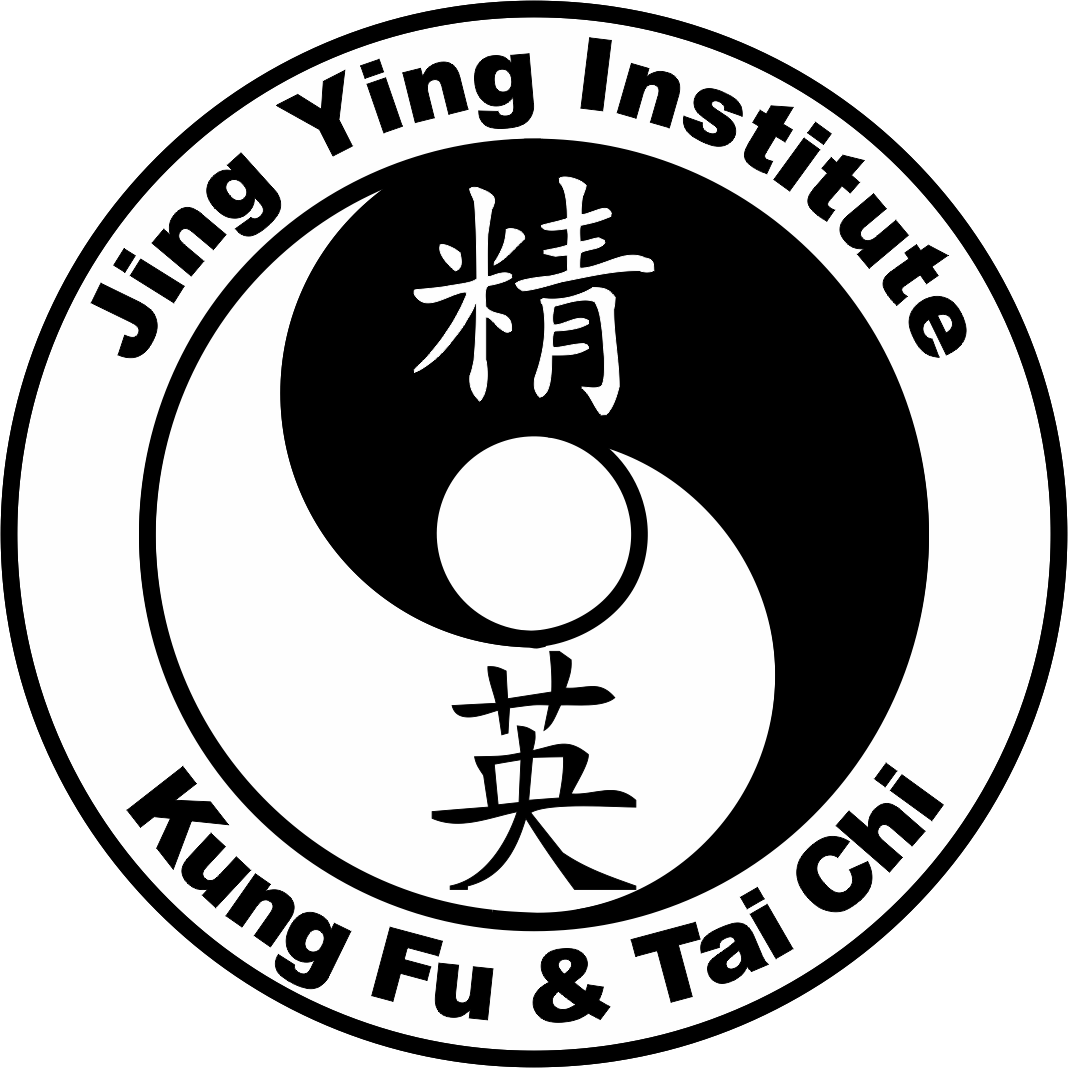Jing Ying Institute Black Sash Students
At Jing Ying Institute, earning a black sash is equivalent to earning a bachelors degree in college. It takes at least the same amount of time studying, but the final examine is even more rigorous. Our candidates for black sash typically undergo 9 months of testing. Why so many tests? One test would be sufficient to demonstrate competency in the required skills, but we want to evaluate more than just knowledge and ability. Some people have natural ability and pick up the skills with relative ease while others have to work much harder. We want to make sure our testing process rewards not just natural ability but also the proper attitude and work ethic. A requirement is that students show improvement over the course of their testing. That shows us they are delving into a deeper understanding of what they have learned and are applying themselves with more effort to improve. It also emphasizes that kung fu is a constant process of effort and time to produce skill. No matter what your ability is, you can always improve.
After the seventh test, a vote will be taken. If the candidate has performed at a good level and demonstrated improvement, then their ninth test will be designated as their final test. If we feel there are any areas that would benefit from additional training, then three months will be added and their twelfth test will be their final one.
May 21, 2016
January 30, 2016
August 23, 2014
February 22, 2014

June 29, 2013
February 23, 2013
April 21, 2012
July 28, 2012
Matthew
Jungnitsch
September 24, 2011
June 27, 2009
Glen Greer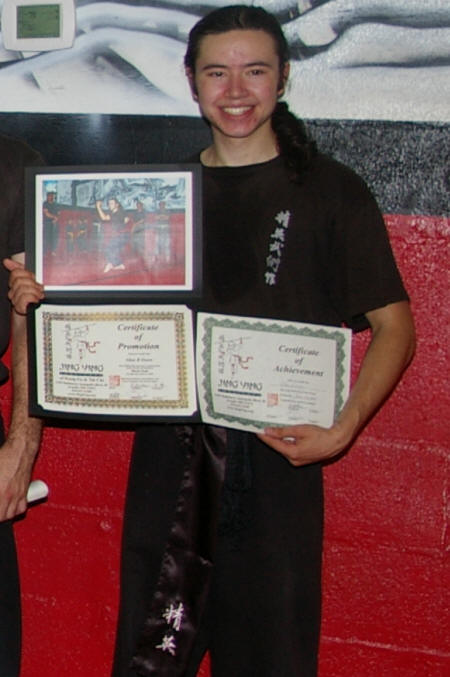
July 26, 2008
(L-R)
Samuel Hokanson, Jose Vega, Lane Greer
July 1, 2006
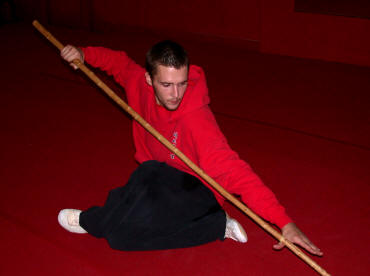 Tim
Cherry
Tim
Cherry
August 27, 2005
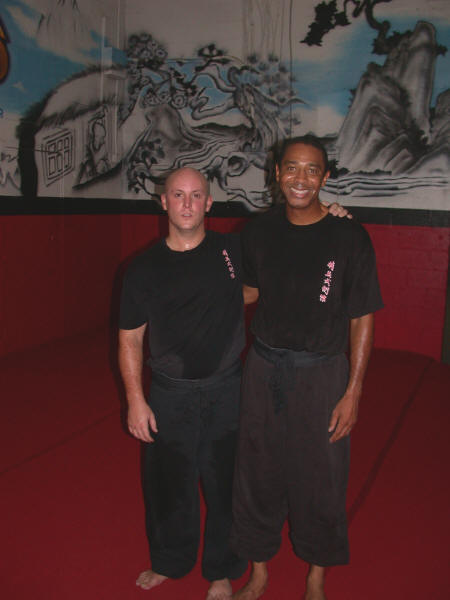 (L-R)
Pete Giguere,
Johnny Thomas
(L-R)
Pete Giguere,
Johnny Thomas
June 26, 2004
Contemplation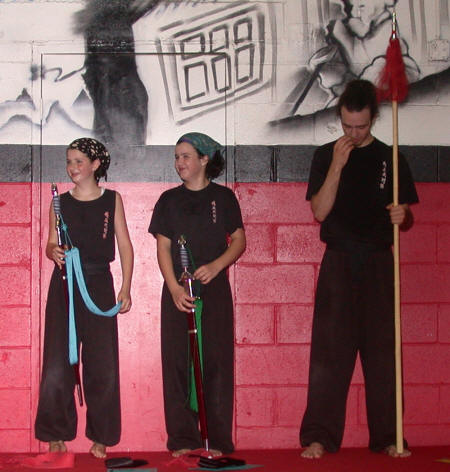
(L-R) Anne Barrow, Arlene Barrow, Clayton Barrow
 Scott
Dunmyer
Scott
Dunmyer
I never studied martial arts as a young child. My path was a much less contrived one, as it began with the study of Buddhism and meditation. In my late teen years I was fortunate enough to realize that my perception of life was quite superficial, which I set out to change. Eventually, in my studies of Buddhism and Taoism I began to understand how undertaking a martial practice with truly honest intentions would be of great value to my path. The simple act of taking care of the body creates the foundation to develop mindfulness and compassion. Physically, martial arts makes the body more supple and healthy, so energy is able to flow freely through the body, which mentally, allows one to benefit from the discipline of a concentrated mind which transcends into all aspects of life. One can achieve a calm and controlled mind, rather than an erratic mind that bounces from one thought to the next, and the ability to conquer afflictive emotions, which will lead to mindfulness and compassion for all beings, thus improving your life and that of those around you. Many see these benefits in practice of forms, but not in sparring. I find the two inseparable. The meditative aspect of forms is apparent, and while sparring is excellent body conditioning, it is also a truly effective means to develop mental and emotional control that will manifest in everyday life, helping you to realize aggression and conflict only leads to suffering. The easiest way to destroy something is to allow it to reach its extreme; therefore, the greatest benefit one can achieve from sparring is eradication of mental defilements (such as anger) and cultivation of compassion. Additionally, if conflict can not be avoided, one is able to keep the aggressor from harming himself or herself, and hopefully turn them towards a happier state of being.
Experience
Bearing some of this in mind and discovering some of it along the way, I undertook my first martial experience sparring
"bare knuckle" in my friend's basement (not advisable). Shortly thereafter I began studying with Shifu Harouna Soumah, who offered a Jeet Kune Do curriculum which introduced me to Filipino martial arts, Muay Thai, Wing Chun and Jun Fan boxing. Eventually I coaxed my teacher into also teaching me Shaolin Wushu. I practiced this odd regiment day and night in between work and school and found myself teaching about eight months later. I then began teaching a Jun Fan boxing class for a local college which gave me freedom to develop a solid teaching style. Shifu Soumah provided a great foundation, but wanting to grow with the creativity of the Shaolin arts, I asked Shifu Sean Marshall to take me as a student where I began my study of Northern Shaolin at East-West Martial Arts. Eventually the school was moved to its current location in Arnold, MD with the name Jing Ying Institute where I teach Northern Shaolin Gongfu and Yang Style Taijiquan. I also teach Tiangang Qigong and Yang Taiji for the Sage House Herb Company, and in July of 2002 I completed training as a novice monk at the Monkgol Tempunee Buddhist Temple which I feel was a great asset that will contribute positively to my teaching.
Teaching
I consider the opportunity to teach to be a great blessing. I try my best to make Jing
Ying a place of solace, free of ego false perception and
distraction. By gauging each student's personality mental disposition and ability I attempt to adapt the teaching to a way best suited for him or her to absorb. Whatever the student is willing to put into his or her training, will be more than reciprocated as long as they are motivated by the purest intentions to better themselves and help others. This I feel is the reason to train in martial arts.
Bless everyone!

